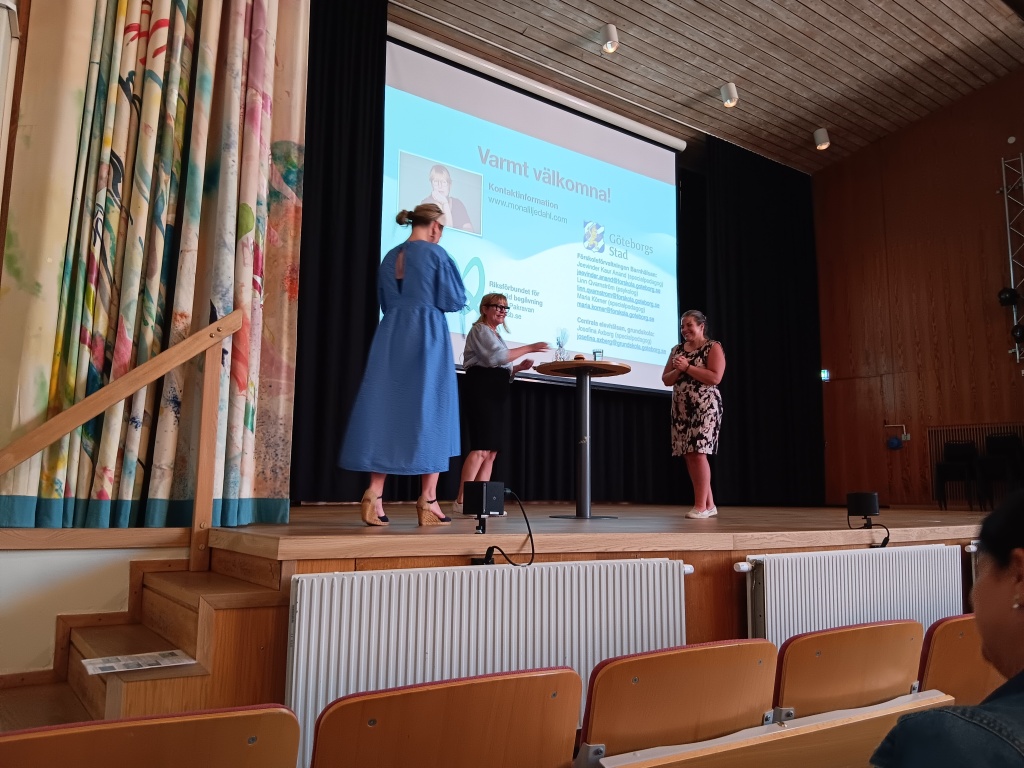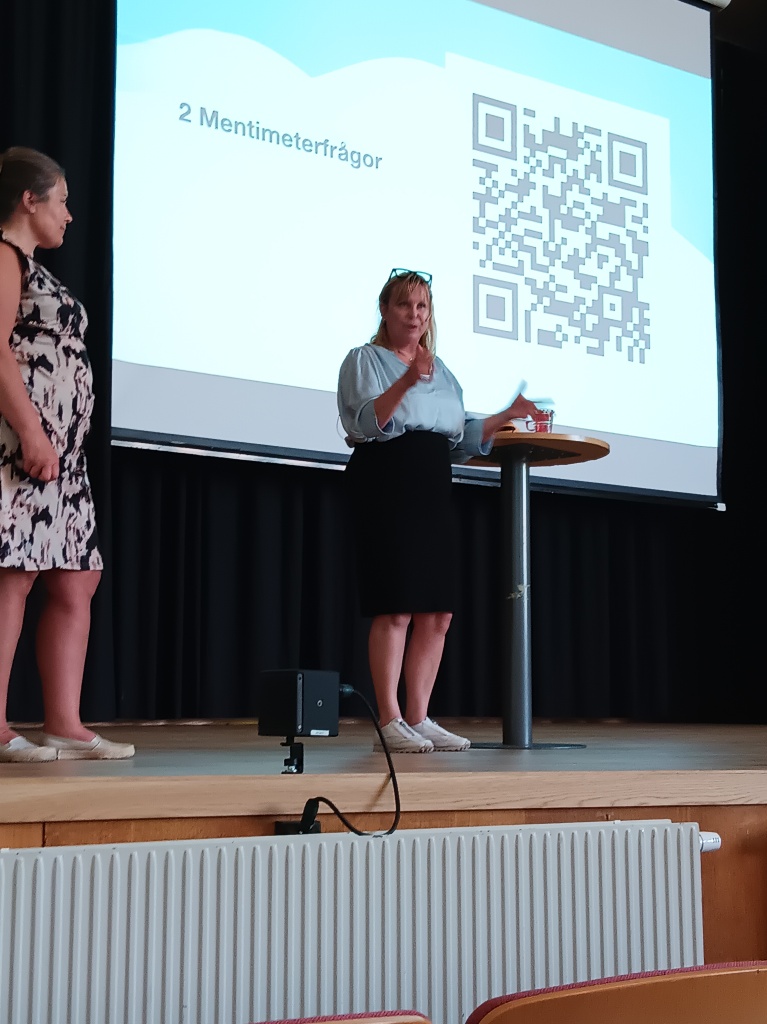Location: Mötescentrum Gothenburg City
Time: 14-16, on May 17th 2024
Leader: Mona Liljedahl


The gifted students often have inner intellectual, untapped resources. These can only be “opened up” in interaction. In that way, intellect is like a parachute.
How can giftedness be recognized?
- Thirst for knowledge and NOT thirst for grades
- Fast learning and memory skills NOT high processing speed or working memory.
- Intensity in thought processes.” NOT intensity in achievements.
- Asynchronicity – maturity in intelligence vs. emotional maturity. The relationship between these may never straighten out.
How do the specially gifted person’s resources open up? Educators need to discover, address, lead and stimulate. How to support? You let gifted students learn from the whole to the detail, the complex to the simple, the end goal to the present. The gifted students do NOT learn gradually. Therefore, the school’s curriculum excludes the gifted, because it is based on gradual learning.
Gifted students want to know WHY, then HOW and finally WHAT when educators are handing out assignments. They also want the pace to progress faster in preschool / school / high school.
- Acceleration: Example: Move grades up. During the conference, there was a child who talked about a successful move up from grades 3 to grade 6. Before, she felt no meaning and that she had to “give” so much to her classmates all the time. Already after a week in the new grade, he felt at home, that she got to learn things and had an “equal exchange” with classmates.
- Enrichment: Already included as thinking.
- Coaching: Needs to be someone who likes the student. Parents need to insist that the school arrange coaching for the students in the school. They also need to coach the student at home.
Schools often lack a structure for this, but there is material on the Swedish National Agency for Education’s website.
To teach gifted students in the classroom, the best way is to create assignments at different levels so that all students are invited to choose the one that suits them.
What happens in reality?
In reality, adaptations are often made only in the subject of mathematics? Why? Because the subject is more linear than other subjects. It is easier to detect advanced abilities in mathematics.
In all subjects, however, acceleration is a must for the mental and social health of the gifted. Enrichment is also important to be able to “run off the brain” during school hours, to do something real / of importance to the individual himself. It is important for the gifted to learn something new, and not just achieve grades and ratings.
A very used / useful resource for schools: Massive open online courses. These courses can be studied in enrichment groups. They contain courses from all over the world. (Some popular ones are: Mandarin Chinese level …, Build your very first IOS app, Climate solutions, The secrets of happiness, Quantum mechanics for scientists and engineers, Steps in Japanese, Stand up comedy writing and performances.)
Meaningfulness is important for especially gifted people, that they get use of their areas of talent. That they get to do something that is important to them, but also that they get to share their thoughts with others. They also need coaching and management, which is gaining ground. Mona Liljedahl calls it “air traffic control”. It needs to be done by someone who likes the student, who has a dialogue with the home, is the student’s voice, the student’s “superhero”, who can differentiate between talent and skills (e.g. can support in case of lack of study strategies and increasing perfectionism), can “listen under the surface” / listen to thoughts, needs, questions that hide behind facades, behaviors and difficulties.
Often, especially gifted students go through a period of “world pain” and arrive at something that they must do (compare Greta Thunberg).
Twice exceptional / 2E – can hide special talent, although the student actually has an easy time to learn. If, for example, they are particularly gifted and have autism, aspberger’s syndrome, add or anything else. (Note: Giftedness can produce some ADHD-like symptoms, without being ADHD.)
Thrice exceptional – special talent + multiple circumstances / complex circumstances (illness, LGBTQIA+, trauma, etc.).

Giftedness in students is more rarely discovered with increasing age.
Already in grade 4, it starts to become more difficult to identify which students are gifted. They start to withdraw and not want to stand out. They lose motivation and find it harder to reach goals.
Trauma affects students’ IQ. The intelligence then locks itself.
However, special talent or IQ has nothing to do with either motivation or performance.
At the age of 5: 50% of gifted kids are identified by educators.
At upper secondary school: <30% are identified by educators. It both has to do with the students’ behavior and our glasses.
Girls are detected to a lesser extent than boys. This is because girls are more often seen as independent than boys. Book tip: Gifted children – Myths and Realities by Ellen Winner, Basic books, New York, 1996.
Boreout – Burnout
For the brain, understimulation and overstimulation are the same thing. It gives the same symptoms. It is important to recognize that the gifted kids who is understimulated will:
- Become depressed.
- Get lower, poor or lost self-confidence
- End up in exclusion or isolation
- Getting the wrong self-image
- Give up
- Experiencing meaninglessness.
- Turns self-recriminations on themselves.
- Feeling stupid.
- Become less likely to complete high school or university studies.
For school staff, it is important to recognize boreout BEFORE it happens.
Here are some characteristics:
- Underperformance
- Skipping school
- Staying at home
- Does not submit assignments
- Fooling around
- Overthinking
- Questioning
- Perfectionism
- Perfectionist locks
- Ruminations, worries
- Anxiety
- Somatic complaints
What should school staff do if they discover this? Maintain a close dialogue with the school counselor and school nurse. If a student is unwell, it is NOT good to give free time or be afraid to have expectations. This makes the student feel even worse. Instead, it is important for the student to learn. It is important to make the student visible and include him in a plan and structure. Adults need to show that “you are one of us”. It is NOT good for students to study different subjects in different grades. Then they become “backpack children” who are not doing well.

It is good if there is someone at the school with training on special talent at the school and that you have an exploratory way of working.
It is important to remember that gifted children have different personalities and characters, just like any other child. These can both benefit or make it more difficult for them to access their inner, intellectual resources.) They can be:
- Sensitive / highly sensitive (have one or more overexcitabilities).
- Suffer from trauma (then they may have had/have it tougher)
- Environment (it is important that the children have access to the resources they need. Compare the importance of the piano to Mozart).
- Opportunity = preschool / school / high school. Need to trigger the inherent in the gifted / get hold of the desire to learn. It is NOT about giving more work. One tip is to inge hope show ways after high school, for example.
Effect of lack of opportunity is understimulation. Then they will also become stressed and feel mentally ill as adults, experience unemployment, dependency on benefits and more.
Other:
It is important that the gifted students do not become/regarded as “little adults” when they are moved up classes. It is still / even more important with free play, to be a child then. Therefore, extracurricular activities for year 6 are especially important for the gifted. They need to be mischievous, wild and a little crazy sometimes. Those who have younger siblings are easier to move up than those who are the youngest sibling or an only child.
It is planned for a National Knowledge Center on giftedness, where educators can call to ask for advice, discuss, and learn about special talent. Because learning all about it will take time. It is not clear when this will happen though.
The border between secondary school to high school needs to be loosened up, so it is easy to collaborate around giftedness. As long as the student is in the secondary school organization, however, it is the secondary school principal who is responsible for the student.
Several gifted adults have had problematic schooling or a variegated career. It is common for the gifted to have problematic relationships with teachers.
Julie Peterson: Playboy playmate, Mensa member and spokesperson, doctor of chiropractic.
Other examples: John Lennon, Albert Einstein.


